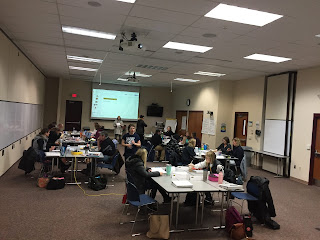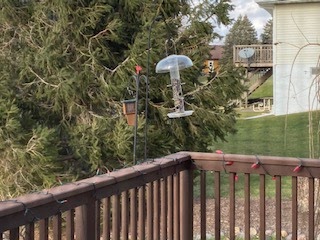Substitute teachers needed? Here we come!
This two-day class was led by teacher Stephanie Lindmark at the Missississipi Bend Area Education Agency and is part of the licensing procedure to become a substitute teacher in Iowa.
The class was large, teacher Stephanie Lindmark said. There were 27 students, or six tables of 4, and one table of 3 adults, all of whom had four-year college academic degrees.
The "substitute teacher" training spread over two days and about 18 hours at the Mississippi Bend Area Education Agency, which is located in the former Bettendorf High School, believe it or not. It's on 23rd Street near downtown Bettendorf, and if you hang around there long enough, you can tell it used to be a high school. (Down the hill from the structure is what was a football field at one time.)
The 27 students included yours truly. We got a crash course in what we were to do when leading a class of students. In the end, we'll receive our license, which allows us to teach children in pre-kindergarten through 12th grades.
A former journalist, I was among just a few of the students who were not already employed by a school district. Several students worked in the schools but were seeking this substitute license. In my group of four, as an example, Angie had recently moved back to Bettendorf and had experience in teaching primary grades; Emily was employed already in the Clinton School District, and Kathy, also from Clinton, was retired as a human resources professional. We four quickly bonded during the weekend of Feb. 9-10.
Lindmark, who teaches in both Davenport and Pleasant Valley districts as well as for the Area Education Agency, or AEA, was a grand leader of adults. Many of us were unused to sitting still for a long time, and she was kind enough to give us time to stand up, take a quick break, or whatever was needed to keep our attention.
The weekend included one full day of how to manage a class. When you get right down to it, the substitute teacher is charged with managing students, despite what the youngsters might throw out at them. I think it's almost human nature to try the patience of people in this type of position.
However, we learned the importance of memorizing names, for example, to show the youngsters how we care. We talked about networking with the school secretaries, teachers in nearby classrooms, janitors and the like. There was a section on security, and when to summon help.
Overall, however, this class involved 27 people who gave up a whole weekend to, in the end, help kids learn. This is not a small thing.
Next we are to get an FBI background check; everyone is serious about safety in the schools. After submitting transcripts from our four-year college (mine's Iowa State University), from the AEA's substitute training class, and from the FBI check, our application goes to the state's Bureau of Educational Examiners. These folks in Des Moines issue licenses for employees of schools districts across Iowa.
After this license is procured, it's up to each of us to check with various school districts on their need for substitutes. Each one is different, we are told.
There is a great need for substitute teachers in our schools. We are among those who are raising our hands to help.
For more information on the class, check the Mississippi Bend Area Education Agency; online at mbaea.org. Betsy Justis coordinates the program locally; she is at bjustis@aea9.k12.ia.us
One highlight of the class was preparing a lesson plan. This project took each team about an hour to do, adhering to Iowa's CORE educational principles. My team "taught" a lesson during Black History Month, for second-graders who would learn about the concept of segregation in an age-appropriate manner ... and about activist Rosa Parks.





Comments
Post a Comment